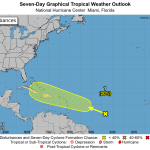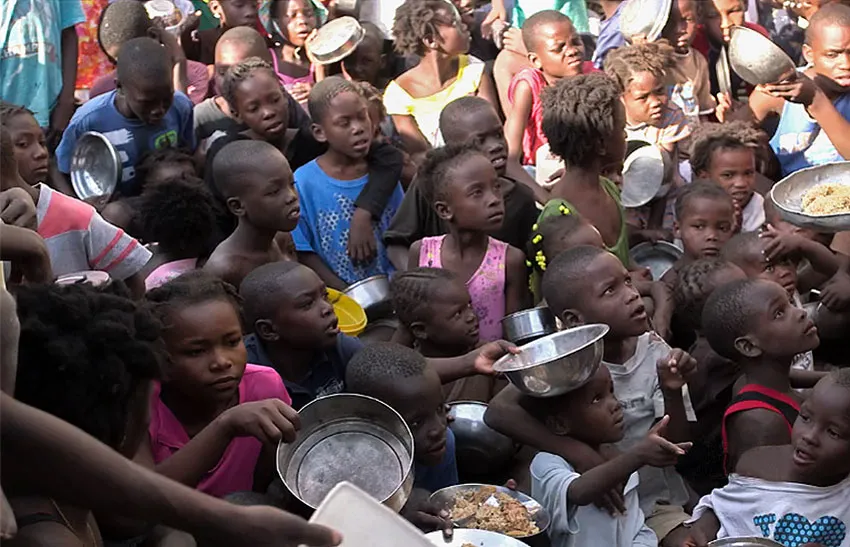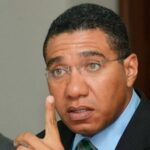The situtation is deteriorating rapidly in Haiti and up to half the population don’t have enough to eat. The international community must take urgent action now. That was the message from speakers at the UN Economic and Social Council today during its Special Meeting to discuss Haiti.
At the outset, the Council, through pre-recorded video messages, heard from three young Haitians students who described their daily struggles in finding food.
Jose Milltrete Montacy, a 20-year-old student, addressing the meeting, questioned: “Why is it that in other countries, food is thrown in the garbage every day while we starve in Haiti?”
Echoing that, Ifender Valcenat, a 17-year-old student, added: “What’s stopping [the international community] from taking action before 100,000 people have died?”
Mervensky Moreau, a 17-year-old student, pointedly asked: “Are you going to let us perish in this unpleasant situation without giving us the help we need?”
To those appeals for help, Lachezara Stoeva (Bulgaria), President of the Council, told the meeting that the 2023 Humanitarian Response Plan for Haiti requires $719 million — more than double the amount for 2022.
Almost half of the Haitian population is going hungry and the country’s recent flooding, landslides and earthquakes have all compounded an already deteriorating situation. “This should be our wake-up call,” she stressed.
Robert Keith Rae (Canada), Chair of the Ad Hoc Advisory Group, said that not a single day goes by when someone does not die as a result of violence, disease or malnourishment.
The international community must support on-the-ground efforts, provide immediate assistance and bolster the resilience of households and small farmers. “This is not only a time to show solidarity with Haiti. It is a time to show action,” he pleaded.
Warning that the risk of civil war is very real, Ricard Pierre, Minister for Planning and External Cooperation of Haiti, called on the international community to support Haiti’s National Police to tackle the “climate of terror” imposed by powerful armed gangs.
Building on that, Ralph E. Gonsalves, Prime Minister of Saint Vincent and the Grenadines and Chair of the Community of Latin American and Caribbean States (CELAC), also in a pre-recorded video message, stressed that funding is critically needed, especially since Haitians cannot wait.
Haiti’s crises must be homegrown and nationally led, but the world cannot overlook the transformative role of regional organizations. “We must be guided by our moral compasses to do more and do better,” he implored.
In that vein, Andrew Holness, Prime Minister of Jamaica, reported on the efforts by the Caribbean Community (CARICOM) to restore Haiti’s political stability.
However, the anarchic situation in Haiti, where criminal gangs control much of the territory, has prevented humanitarian agencies from delivering assistance. “We must break this vicious cycle,” said Holness.
Sounding the alarm, Cindy McCain, Executive Director of the World Food Programme (WFP), in a pre-recorded message, warned that WFP will be unable to reach 1 million people without $122 million over the next six months.
Calling on the international community to act now to provide food and cash transfers, she emphasized: “Together, we can make a difference and help the people of Haiti rebuild their shattered lives.”
Catherine Russell, Executive Director of the United Nations Children’s Fund (UNICEF), reported that children are being killed on their way to school, along with staggering levels of sexual and gender-based violence.
As well, the national health system cannot respond to the country’s malnutrition crisis and ongoing cholera outbreak.
The international community must move away from treating these crises as separate events and view Haiti’s situation as a longer-term development crisis exacerbated by recurring acute emergency phases, she insisted.
Delegates, voicing their solidarity and support for Haiti in the ensuing interactive dialogue, urged the international community to respond with tangible actions.
Root causes must be understood and addressed, many emphasized, as they highlighted their Government’s assistance to that country and called for greater humanitarian aid and access.
Several, however, pointed out that any external actions must be in line with Haiti’s priorities, especially since a sustainable solution must be Haitian led, owned and focused. “This is not the time to turn a blind eye to a country already on fire,” Germany’s representative stressed as Brazil’s representative called for “all hands on deck” situation.
The representative of Cuba emphasized that the world owes Haiti a debt for being the world’s first revolution led by Black slaves and the first republic on the continent to abolish slavery.
He also detailed Cuba’s support to Haiti over the past 25 years, including post-disaster aid, medical cooperation, various vaccines and literacy assistance that has aided 448,000 Haitians.
The representative of Ecuador highlighted the Security Council’s role in helping Haiti overcome the threats posed by gangs, citing the upcoming renewal of the United Nations Integrated Office in Haiti (BINUH).
As well, support must be lent to the Haitian National Police, he said, before asking about elements in the youth-peace-security agenda that might help the country overcome the crises it faces.










